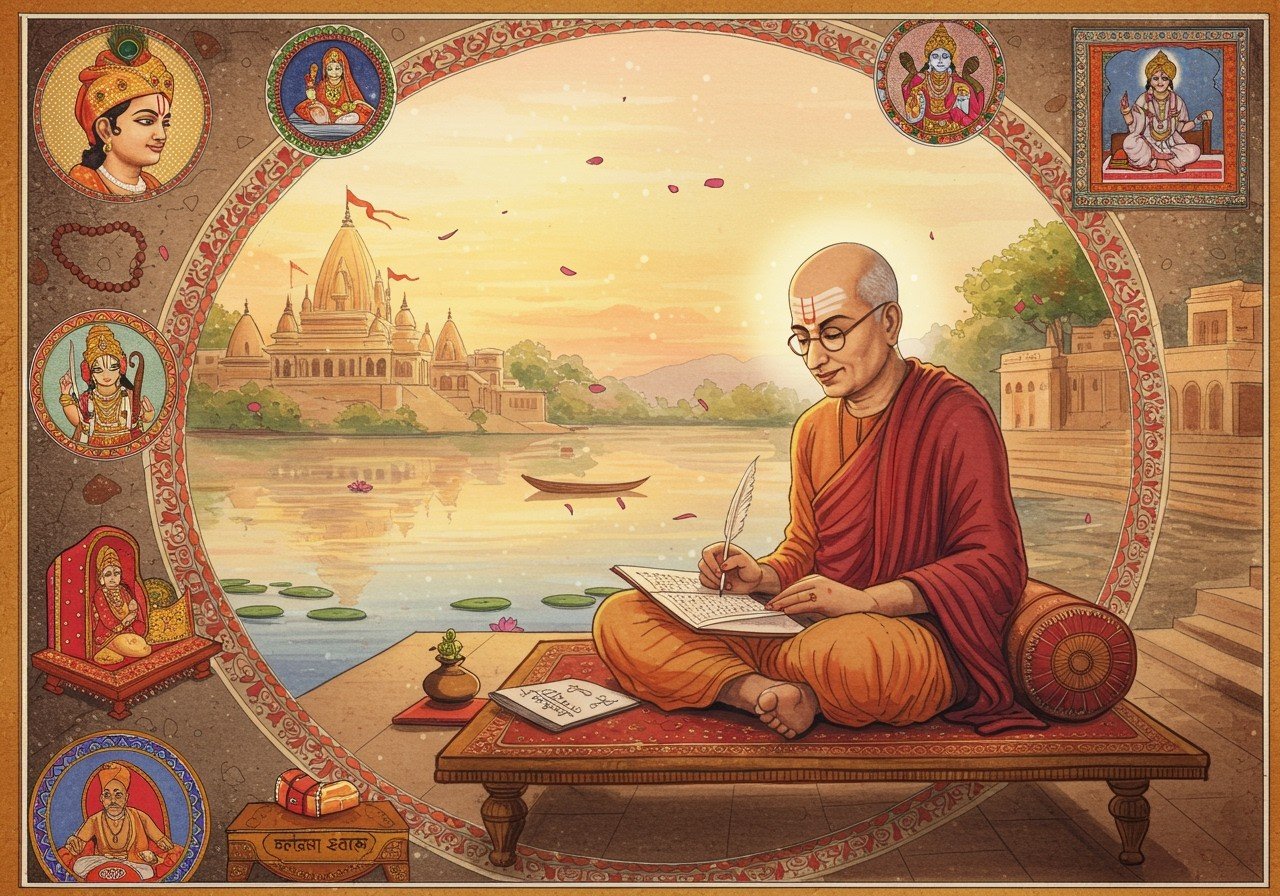
Bhaktivinoda Thakur (1838-1914), a luminary of the Gaudiya Vaishnavism tradition, led a life steeped in devotion, prolific writing, and fervent preaching. While a precise, universally prescribed “daily sadhana” by him isn’t readily available, we can glean insights into his spiritual practices from various sources, offering us a glimpse into his rich devotional life. His deep commitment to bhakti continues to inspire seekers on their spiritual paths even today.
A Day in the Life of Bhaktivinoda Thakur
Bhaktivinoda Thakur’s days were a harmonious blend of spiritual practices, scholarly pursuits, and tireless service. His dedication to spreading the teachings of Chaitanya Mahaprabhu shaped his daily routines, influencing countless followers. Let us explore the tapestry of his daily life:
- Writing and Study: A prolific author, Thakur often burned the midnight oil, immersed in his writing. Some accounts mention him rising before 10:00 PM and writing until 4:00 AM. This dedication resulted in nearly 100 books on Bhakti, enriching the spiritual landscape of Gaudiya Vaishnavism. His writings continue to be a source of wisdom and guidance for devotees worldwide. For those seeking a deeper understanding of Bhakti, exploring his works can be a truly enriching experience.
- Chanting (Japa): The Hare Krishna maha-mantra held a central place in his sadhana. He emphasized its transformative power and incorporated it into his daily routine. Rising at 4:30 AM, he would first attend to his ablutions and then engage in japa, connecting with the divine through the rhythmic chanting of sacred names. He practiced japa meditation with a Tulsi mala, considering it a powerful tool for spiritual connection. You can find authentic Tulsi malas and other Japa essentials at Poojn.in.
- Rest: Even amidst his demanding schedule, he recognized the importance of rest. He typically rested between 7:30 PM and 8:00 PM, ensuring he had the energy to sustain his rigorous spiritual practices and demanding work. This brief respite allowed him to rejuvenate and continue his service with renewed vigor.
- Preaching and Propagation: A passionate preacher, Bhaktivinoda Thakur founded “nama-hattas,” traveling preaching programs that spread Chaitanya’s teachings across Bengal. He also utilized his magazine, “Sajjana-tosani,” as a platform to disseminate these profound teachings to a wider audience. His tireless efforts played a pivotal role in the revival of Gaudiya Vaishnavism.
- Temple Duties and Discourses: As the manager of the Jagannatha Puri Temple, Thakur ensured the smooth and regular performance of deity worship. He established the “Bhakti Mandapa” in the temple courtyard, creating a dedicated space for daily discourses on the Srimad Bhagavatam, nurturing a vibrant spiritual community.
- Spiritual Discussions: Thakur cherished engaging in discussions about Krishna and chanting at sacred sites. He spent hours immersed in these spiritual exchanges at places like Tota-Gopinatha Mandir and the tomb of Haridasa Thakur, fostering a deeper connection with the divine and fellow devotees. Such discussions were crucial for strengthening spiritual understanding and fostering a sense of community.
- Simple Living: He embraced a life of simplicity, minimizing his personal needs and focusing on his spiritual pursuits. This minimalist approach allowed him to dedicate his time and energy to his devotional practices and service to others, embodying the spirit of renunciation and detachment.
Core Principles for Sadhana
Beyond his daily routine, Bhaktivinoda Thakur emphasized key principles that formed the bedrock of his spiritual practice and teachings. These principles offer invaluable guidance for anyone seeking a deeper, more meaningful spiritual life:
- Humility: He stressed the importance of cultivating genuine humility, advocating for a posture of being “lower and more humble than straw in the street” and relinquishing false pride. True spiritual growth, he believed, begins with a humble heart.
- Tolerance and Forgiveness: Thakur encouraged practicing forgiveness with the unwavering resilience of a tree, letting go of grievances and embracing compassion.
- Non-Violence (Ahimsa): He advocated for complete non-violence towards all living beings, recognizing the interconnectedness of life and the importance of respecting all creatures.
- Compassion and Kindness: He believed in actively cultivating compassion, urging his followers to never cause anxiety to others but instead to strive to do good and bring happiness to those around them.
- Renunciation of Fame and Honor: He encouraged the renunciation of desires for fame and recognition, emphasizing the importance of detachment from worldly accolades and focusing on inner transformation.
- Respect for All: Recognizing the divine spark within all beings, he emphasized respecting everyone, irrespective of their background or beliefs. This inclusivity reflects the core principle of unity in diversity.
- Eagerness for Sadhana: He emphasized that the process of sadhana itself is crucial for deepening one’s yearning for the Supreme, fostering a continuous cycle of spiritual growth.
- Avoiding Obstacles to Bhakti: He advised immediate abandonment of anything that hindered one’s bhajana (devotional practice), recognizing the importance of creating a conducive environment for spiritual progress.
- Satsang (Good Association): Thakur emphasized the importance of associating with devotees, creating a supportive community that reinforces spiritual values and practices.
- Service (Seva): He advocated for continuous, uninterrupted, and confidential service to the divine and others, viewing it as a vital expression of devotion.
Poojn.in: Supporting Your Spiritual Journey
At Poojn.in, we understand the significance of having access to authentic and high-quality items for your spiritual practices. Whether you need a mala for japa, incense for your altar, or a copy of the Bhagavad Gita for study and reflection, we offer a wide range of products to support your devotional journey. Explore our collection of holy idols, puja utensils, holy cosmetics, jaribooti and holy food.
Embrace the Wisdom of Bhaktivinoda Thakur
Bhaktivinoda Thakur’s life and teachings serve as a profound source of inspiration for those seeking a life imbued with devotion and spiritual meaning. By embracing his principles and incorporating them into our daily lives, we can embark on a transformative journey towards inner peace, self-realization, and a deeper connection with the divine. His legacy continues to resonate with spiritual seekers across the globe, reminding us of the timeless power of bhakti.
Explore more about Hindu rituals and spirituality in our other blog posts: Understanding Puja: A Simple Guide to Hindu Rituals and Mindfulness, Meditation, and Spirituality in Daily Life.
Delve deeper into the essence of Bhakti with our insightful blog posts: Bhakti Yoga: A Path to Divine Love and Devotion and Sarvamangla: An Entrepreneurial Story Rooted in Hindu Values. We offer a rich exploration of spiritual growth and the practical application of these values in everyday life.
Enhance your spiritual practices with authentic products from Poojn.in. We offer a wide range of items, including pobitro mahasnan toilo samagri and bhoj patra, carefully selected to enhance your spiritual journey. Discover the perfect tools to deepen your connection with the divine.


